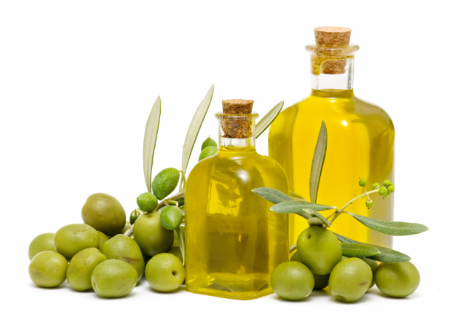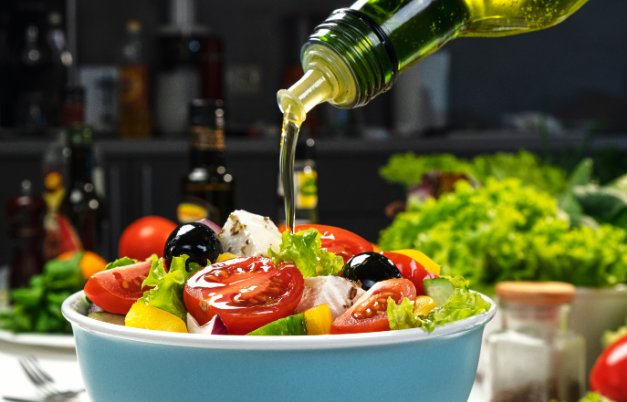
To shed light on commonly asked questions about extra virgin olive oil, we have compiled a list of FAQs and their respective answers:
1. What is extra virgin olive oil?
Extra virgin olive oil is the highest grade of olive oil, extracted solely through mechanical means without the use of heat or chemicals. It is prized for its exceptional taste, aroma, and health benefits.
2. How is extra virgin olive oil different from other types of olive oil?
Extra virgin olive oil is distinct from other types due to its superior quality. It is made from the first cold pressing of fresh olives, ensuring a pure and unaltered product. Other grades, such as virgin or light olive oil undergo additional processing, altering their flavor and reducing the nutritional content.
3. What gives extra virgin olive oil its unique flavor?
The flavor of extra virgin olive oil is influenced by various factors including the type of olives, the region where they are grown, and the harvesting and extraction methods. Common flavor notes include fruity, peppery, and sometimes a level of bitterness.
4. How should I store extra virgin olive oil?
To preserve its quality, store fresh extra virgin olive oil in a cool, dark place, away from heat and any sources of light. Use a tightly sealed container to prevent exposure to air, which can lead to premature oxidation.
5. Can extra virgin olive oil go bad?
Yes, unopened extra virgin olive oil can go bad over time. Factors such as exposure to light, air, and heat can contribute to its degradation. Check for signs of rancidity, such as a musty smell or off taste, and discard it when you feel that the oil has gone bad. Try to finish a bottle within six months of opening.
6. Is extra virgin olive oil suitable for cooking at high temperatures?
While extra virgin olive oil has a lower smoke point compared to some other cooking oils, it is suitable for sautéing and light frying. However, it is advisable to use processed olive oils with higher smoke points for deep frying and high heat cooking.
7. Does extra virgin olive oil lose its health benefits when heated?
While heating extra virgin olive oil may cause some loss of its antioxidants, it still retains numerous health benefits. Its high monounsaturated fat content, which is heart-healthy, remains intact even with moderate heating up to 375 degrees Fahrenheit.
8. Can extra virgin olive oil be used for baking?
Yes, extra virgin olive oil can be used in baking, adding a distinct flavor to various recipes. Consider using it in cakes, bread, and other baked goods that complement its fruity and aromatic profile.
9. How can I distinguish high-quality extra virgin olive oil?
Look for indicators such as dark or opaque containers, check the label for certification seals from reputable quality and origin verification agencies, and always check for a harvest date on the label. Additionally, genuine extra virgin olive oil often has a robust and fresh aroma. Some of the finest high quality EVOOs are very smooth and mild in taste and aroma.
10. What is the Mediterranean diet, and how does extra virgin olive oil fit into it?
The Mediterranean diet is characterized by a high consumption of fruits, vegetables, leafy greens, whole grains, fish, lean meats, and olive oil. Extra virgin olive oil is a key component, providing healthy monounsaturated fats and antioxidants that contribute to the diet’s overall health benefits.
11. Is extra virgin olive oil suitable for individuals with allergies?
Extra virgin olive oil is generally well-tolerated and does not contain common allergens. However, individuals with olive or other allergies should exercise caution and consult with a healthcare professional before introducing olive oil into their diet.
12. Can extra virgin olive oil help in weight management?
Yes, extra virgin olive oil, when consumed in moderation as part of a balanced diet, may contribute to weight management. Its monounsaturated fats can help promote satiety and reduce overall calorie intake.
13. Is there a difference between organic and non-organic extra virgin olive oil?
Organic extra virgin olive oil is produced without synthetic pesticides or fertilizers. While both organic and non-organic versions can be healthy choices, choosing organic may appeal to those seeking an organic option. The health benefits are similar for each type of EVOO.
14. Can extra virgin olive oil be used for skincare?
Yes, extra virgin olive oil has been used for centuries for skincare due to its moisturizing and antioxidant properties. It can be applied topically to hydrate the skin and may help alleviate certain skin conditions.
15. Does extra virgin olive oil have cholesterol?
No. Extra virgin olive oil is free of cholesterol and very low in saturated fat. Its monounsaturated fats, specifically oleic acid, have been linked to various health benefits, including improved heart health.
16. Can extra virgin olive oil be used as a salad dressing?
Absolutely! Extra virgin olive oil makes an excellent base for salad dressings, enhancing the flavors of fresh vegetables and leafy greens. Combine it with balsamic vinegar, lemon juice, and herbs for a delicious and nutritious dressing. Click HERE for a simple olive oil salad dressing.
17. Is there a recommended daily intake of extra virgin olive oil?
There is no specific daily intake recommendation for extra virgin olive oil. However, incorporating it into a balanced diet as the primary source of fat is a healthy choice. If you are drinking it straight, the Mayo Clinic recommends two tablespoons a day. That is equal to one full shot glass every day. I have researched this topic carefully. The recommended amount to drink daily varies from two tablespoons a day, to four tablespoons a day. I personally drink two tablespoons of Atlas EVOO every day.
18. How does extra virgin olive oil contribute to heart health?
The monounsaturated fats in extra virgin olive oil have been associated with lower levels of bad cholesterol (LDL) and higher levels of good cholesterol (HDL), contributing to heart health. Additionally, its antioxidant content may help to reduce internal inflammation.
19. Can pregnant women consume extra virgin olive oil?
Yes, extra virgin olive oil is generally safe for pregnant women when consumed in moderation. Its nutritional profile, including healthy fats and antioxidants, can contribute to a well-balanced diet during pregnancy. Please research olive oil’s relation to pregnancy prior to adding olive oil to your diet. Consult with a healthcare professional prior to making any changes to your diet during pregnancy.
20. Are there any known contraindications for consuming extra virgin olive oil?
While extra virgin olive oil is considered safe for most people, individuals with specific medical conditions or allergies should consult with a healthcare professional before making any significant changes to their diet.
Extra virgin olive oil stands out not only for its culinary versatility but also for its numerous health benefits. Whether used in cooking, baking, or as a dressing, this golden elixir adds a touch of richness to various dishes while promoting overall well-being.
By understanding these frequently asked questions, you can make informed choices about incorporating extra virgin olive oil into your daily diet.
For more specific information about the various FAQs and other important information, please refer to the “Articles” at the right side of each page or from the menu above.
Please leave comments, questions or suggestions below.
Tom – Olive Oil Lover


